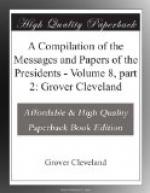It is our duty to repeal these laws. It is not worth while to attempt the repeal except upon an appropriation bill. The Republican Senate would not agree to nor the Republican President sign a bill for such repeal. Whatever objection to legislation upon appropriation bills may be made in ordinary cases does not apply where free elections and the liberty of the citizens are concerned. * * * We have the power to vote money; let us annex conditions to it, and insist upon the redress of grievances.
By another distinguished member of the House it was said:
The right of the Representatives of the people to withhold supplies is as old as English liberty. History records numerous instances where the Commons, feeling that the people were oppressed by laws that the Lords would not consent to repeal by the ordinary methods of legislation, obtained redress at last by refusing appropriations unless accompanied by relief measures.
That a question of the gravest magnitude, and new in this country, was raised by this course of proceeding, was fully recognized also by its defenders in the Senate. It was said by a distinguished Senator:
Perhaps no greater question, in the form we are brought to consider it, was ever considered by the American Congress in time of peace; for it involves not merely the merits or demerits of the laws which the House bill proposes to repeal, but involves the rights, the privileges, the powers, the duties of the two branches of Congress and of the President of the United States. It is a vast question; it is a question whose importance can scarcely be estimated; it is a question that never yet has been brought so sharply before the American Congress and the American people as it may be now. It is a question which sooner or later must be decided, and the decision must determine what are the powers of the House of Representatives under the Constitution, and what is the duty of that House in the view of the framers of that Constitution, according to its letter and its spirit.
Mr. President, I should approach this question, if I were in the best possible condition to speak and to argue it, with very grave diffidence, and certainly with the utmost anxiety; for no one can think of it as long and as carefully as I have thought of it without seeing that we are at the beginning, perhaps, of a struggle that may last as long in this country as a similar struggle lasted in what we are accustomed to call the mother land. There the struggle lasted for two centuries before it was ultimately decided. It is not likely to last so long here, but it may last until every man in this chamber is in his grave. It is the question whether or no the House of Representatives has a right to say, “We will grant supplies only upon condition that grievances are redressed. We are the representatives of the taxpayers of the Republic. We, the House of Representatives,




